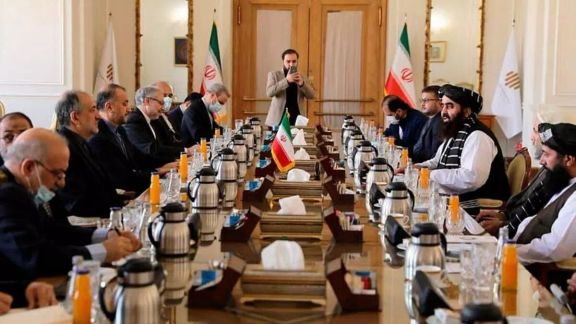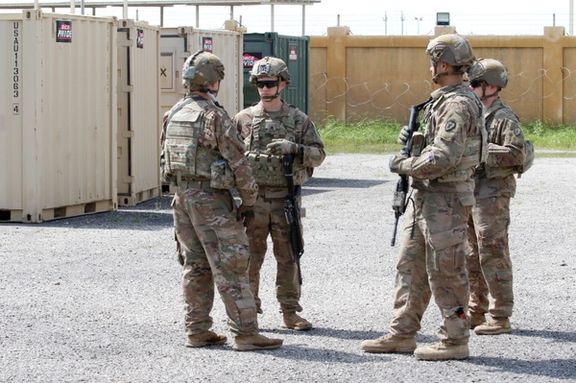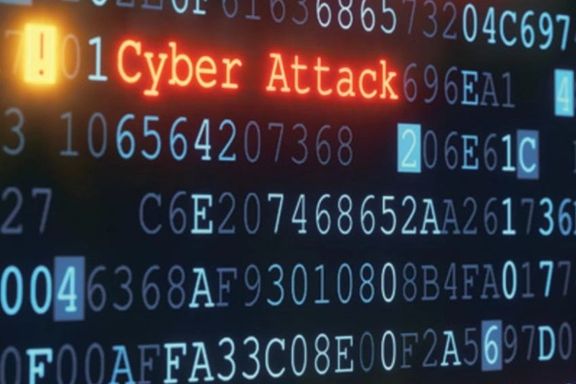'Israeli' Ship Targeted By Houthis Is Liberia-Flagged - Security Firm

British maritime security firm Ambrey said that a container ship targeted by Yemen's Houthis on Tuesday was Liberia-flagged and headed for Somalia.

British maritime security firm Ambrey said that a container ship targeted by Yemen's Houthis on Tuesday was Liberia-flagged and headed for Somalia.
The Iran-aligned Houthi militia said it had targeted an Israeli cargo ship, the "MSC Silver", in the Gulf of Aden, next to the Red Sea, with a number of missiles.
Houthi military spokesman Yahya Sarea did not elaborate, but in a statement said the group had also used drones to target a number of US warships in the Red Sea and Arabian Sea as well as sites in the southern Israeli resort town of Eilat.
"The Houthis characterized the vessel as Israeli. The operator was publicly listed as (in) cooperation with ZIM and regularly called (at) Israeli ports," the Ambrey advisory note said.
Zim Integrated Shipping Services Ltd, commonly known as ZIM, is a publicly held Israeli international cargo shipping company headquartered in Israel.
The Houthis, who control Yemen's most populous regions, have attacked vessels with commercial ties to the United States, Britain and Israel, prompting retaliatory Western strikes on Houthi military sites in Yemen.
The Houthis have vowed to continue targeting ships linked to Israel in solidarity with Palestinians until Israeli forces stop their war in Gaza.
"There is no danger to international or European navigation so long as there are no aggressive operations, and thus, there is no need to militarize the Red Sea," Houthi spokesman Mohammed Abdul Salam said in a post on X on Tuesday.
"What the world is impatiently waiting for is not the militarization of the Red Sea, but rather an urgent and comprehensive declaration of a ceasefire in Gaza, for humanitarian reasons that are clear to anyone."
(Reporting by Reuters)

A US military Mq-9 drone was shot down near Yemen by Iran-backed militants, two US officials said on Tuesday, the second time such a shoot down has taken place in recent months during a near daily tit-for-tat between the group and US forces.
The Houthis, who have controlled most of Yemen for nearly a decade, have carried out repeated drone and missile strikes since November in the Red Sea and Bab al-Mandab Strait against commercial and military ships. US and British forces have responded with multiple strikes on Houthi facilities but have so far failed to halt the attacks.
One of the officials, speaking on the condition of anonymity, said initial information showed that the US drone, made by General Atomics, was hit near Hodeidahon Monday. The official said information could change and did not say if the drone was in international airspace.
The second official said the drone was shot down by a Houthi surface-to-air missile fired from near Hodeida.
The comments by the officials confirm a claim by the Houthis that they had shot down a drone near the port city.
In November, another Mq-9 was shot down by the Houthis and two drones were brought down by the group in 2019.
The Houthi militants said on Monday they had attacked the Rubymar cargo vessel in the Gulf of Aden, which was at risk of sinking, raising the stakes in their campaign to disrupt global shipping in solidarity with Palestinians in the Gaza war.
Despite Western attacks on them in Yemen, the Houthis have vowed to continue targeting ships linked to Israel until attacks on Palestinians in the Gaza Strip stop.
(reporting by Reuters)

The hacktivist group Edalat-e Ali has disclosed a major breach in the servers of the Iranian judiciary, boasting access to a vast repository comprising millions of files and a treasure trove of confidential documents.
The documents encompass a spectrum of sensitive subjects, ranging from internal deliberations within the National Security Council following the death of Mahsa Amini to efforts aimed at quelling unauthorized VPN vendors, protests against the 2020 employment examination, and cases related to economic corruption.
The group unveiled a series of documents suggesting the complicity of the Iranian government in prosecuting prominent public figures during the 2022 uprising and preceding events.
Edalat-e Ali exposed document highlighting the Iranian regime's clandestine endeavors to exert control over public figures, particularly those occupying influential positions in the realms of entertainment and sports. Financial sanctions, bank freezes, travel bans and more have hit celebrities across the board.
They revealed a list encompassing 29 cinema and television figures alongside football stars accused of crimes including "anti-government propaganda activity" and allegations of "conspiracy and collusion against national security."
Actress Katayoun Riyahi, known for her public appearances without compulsory hijab during the uprising following Mahsa Amini's killing, faces charges encompassing “conspiracy, anti-government activities, and inciting moral corruption through her actions.”

Similarly, football icons like Ali Daei, Aref Gholami, and Voria Ghafouri have been accused of fomenting dissent and engaging in activities deemed against national security.
The document, authored by Mohammad Mehdi Heidarian, the then head of the Joint Working Group on Celebrity Management and advisor to the Minister of Culture in 2019, outlines a comprehensive strategy involving multiple government entities tasked with overseeing and managing public figures, thus underscoring the regime's efforts to suppress dissent and enforce conformity.
Edalat-e Ali's ascendancy to prominence traces back to August 2021, marked by their penetration of the surveillance infrastructure at Evin Prison, supporting the ongoing protests and voicing advocacy for the release of political detainees.
The group's previous revelations, including documents implicating security forces in acts of sexual assault and extrajudicial violence against protesters, underscore the gravity of the situation and the need for accountability within Iran's governing apparatus.
The latest hacking is one in a long line of cyber attacks on the regime. The incidents have escalated since the 2022 uprising. From breaches in the judiciary's servers to infiltrations of surveillance infrastructure at Evin Prison and servers belonging to the Islamic Republic of Iran Broadcasting (IRIB), these hacks have underscored the vulnerability of Iran's digital infrastructure.
Each breach has not only exposed confidential information but also served as a catalyst for heightened scrutiny of the regime's activities and policies. The frequency and scale of the hacks reflect the ongoing tensions within Iranian society and the determination of hacktivists to challenge the status quo.
In the past year, MEK-affiliated hackers have targeted the portals of several other government agencies including Tehran Municipality, the Presidential Office, and the ministries of Foreign Affairs, Agriculture, and Culture as well as the parliament and published thousands of documents. In December, a cyberattack paralyzed much of the country's network of gas stations.
This week, documents were leaked following the hack of the Iranian parliament’s media arm, revealing a wide range of Tehran’s strategies to circumvent US sanctions.
Last week, hacktivist group Uprising till Overthrow took responsibility for the recent cyberattack on the Khaneh Mellat News Agency, the media arm of the Iranian Parliament.In a statement released by the group, closely affiliated with the Albania-based opposition Mujahideen-e Khalq (MEK) organization, it was disclosed that the attack reached 600 of the the main servers of the parliament, commission servers, main chamber servers, parliament assistant servers, parliament bank server, and other servers related to administrative functions.
Cybersecurity specialist Amin Sabeti claims Iran will continue facing increasing cyberattacks due to “structural defects” in their cyber defense systems. He claimed that many projects aimed at developing what the regime terms “domestic services” have failed due to their reliance on corrupt connections and nepotism rather than meritocracy and expertise.
It has led to domestic criticism in the face of the regime's weakness. Shahriar Heydari, deputy chairman of the National Security and Foreign Policy Commission of the Iranian parliament, stated that the National Organization for Passive Defense and the Intelligence Ministry should be held accountable for the recent cyberattacks.“Cyberspace is a war of information. Every country needs to secure its systems against hacking and data theft,” Heydari said.

Iran is trying to derail UN efforts to help internal dialogue in Afghanistan and foster engagement between Kabul and the international community, diplomatic sources have told Iran International.
The United Nations secretary general Antonio Guterres told a press conference in Doha on Monday that he will begin consultations on the appointment of a UN envoy to coordinate engagement between Afghanistan's Taliban and the international community.
Antonio Guterres said that Taliban representatives did not accept an invitation to a meeting of international envoys to Afghanistan that he convened in Doha on Sunday and Monday.
Diplomatic sources indicate that Tehran believes such efforts will reduce its influence with the Taliban in Afghanistan and boost US influence.
Afghanistan International, the sister broadcaster to Iran International, asked Iran’s representative, Hassan Kazemi Qomi, if Tehran was working against the goals of the Doha meeting. Qomi responded that the Islamic Republic of Iran engages in efforts that “benefit the Afghan people.”
Many international and non-governmental organizations and activists have attended the two-day meeting in Qatar. Guterres held closed-door meetings with diplomats and organizations to consult on prospects of improving the situation in Afghanistan and relations with Kabul.

The Taliban government is largely unrecognized in the world, but it seems in no hurry to gain international acceptance.
The Taliban have refused the invitation from the UN Department of Political Affairs and Peacebuilding (DPPA) to attend the gathering. While Iran sent a representative, Russia has also refused to attend on the request of the Taliban.
Iran’s clerical regime and the Taliban have had mixed relations since 2021, when the US-supported government fell in Kabul and the militant group took over Afghanistan. Border clashes, a water dispute and million of Afghan refugees crossing the border into Iran have marked their attempts to foster relations.
Amid impasse on these issues, a 30-member Taliban “economic delegation” visited Iran in November. The delegation held talks with Iranian authorities on trade, transit, transportation, infrastructure, and railways, as well as regional development and the issue of the growing number of Afghan migrants in Iran.
The Afghan delegation was led by Abdul Ghani Baradar, First Deputy Prime Minister for Economic Affairs of Afghanistan and a co-founder of the Taliban along with Mullah Omar.
Amid the escalating Hamas-Israel conflict, the visit by the Afghan delegation was also be related to security issues. Baradar also held a meeting with Iran’s top security chief Ali-Akbar Ahmadian, the Secretary of the Supreme National Security Council and a close aide to Supreme Leader Ali Khamenei. "Afghanistan will not pose a threat to any of its neighbors," the Taliban official said according to IRNA.
Tehran has been urging internal reconciliation in Afghanistan between the Taliban, which heavily represent the Pashtuns in the country and Persian-speaking ethnic groups such as the Hazara. However, the Taliban reject Tehran’s call insisting that they are the government, and everyone should fall in line.
The aim of UN’s DPPA is to reintegrate Afghanistan into the world community with the objective of a country “at peace with itself and its neighbors, fully reintegrated into the international community, and meeting international obligations.”

Amid escalating tensions over Iran's regional influence, Tehran repeated its stance against the presence of foreign forces in Iraq.
Nasser Kanaani, the spokesperson for Iran's foreign ministry, stated during a weekly briefing on Monday that Tehran views the implementation of a security agreement with Baghdad as beneficial for both countries' security interests.
"We do not see the presence of foreign forces in Iraq as helpful to Iraq's security, and we fundamentally oppose the presence of foreign forces in the region," Kanaani claimed. "We believe they have never been effective in ensuring regional security and, in fact, are detrimental to the security of the region."
Kanaani also expressed support to see the withdrawal of American forces. Iran's proxies in Syria, Yemen and Iraq have launched around 200 attacks on US troops and facilities in the region as retaliation for supporting the right of Israel to defend itself in the wake of the Hamas attacks on October 7.
The US stationed troops in Iraq after the 2003 invasion to combat terrorism and stabilize the country. Their presence continues as part of broader counterterrorism efforts against groups like ISIS, contributing to regional stability. US forces support Iraqi security forces with training, equipment, and advisory assistance to combat terrorism and protect sovereignty.
However, Iran supports proxy militias in Iraq to extend its regional influence and shape Iraqi politics. Viewing the US presence as a threat, Iran backs groups opposing it to undermine American influence and pressure troop withdrawal. Most proxies are Shiite Muslims, aligned with the regime, reflecting Iran's aim to empower Shiite communities and promote its Islamic ideology.
Iraq finds itself caught in the crossfire between the United States and Iran with conflicting interests. Since the US invasion in 2003, Iraq has struggled to maintain stability amidst political turmoil, sectarian violence, and external interference. With Iran exerting considerable influence over Iraqi politics and security through proxies and militias, tensions have escalated as the US and Iran engage in a complex geopolitical struggle for dominance in the region.
The assassination of Iranian Former IRGC Quds Force Commander Qasem Soleimani by a US drone strike in Baghdad further heightened tensions, pushing Iraq into the center stage of the conflict. Iraqi leaders face the daunting task of balancing their relationships with both the US and Iran while safeguarding their country's sovereignty and stability.
However, the balancing act is increasingly challenging as Iraq risks becoming a battleground for proxy conflicts and retaliation between Tehran and Washington, further exacerbating the already fragile situation in the region.

A Russian-linked hacking group has conducted espionage operations targeting government and military entities across Europe, as well as Iranian embassies in Russia.
The hackers, known as TAG-70, aimed to gather intelligence on European political and military activities, with potential aims to "to gain strategic advantages or undermine European security and alliances," researchers from Recorded Future’s Insikt Group revealed.
The investigation was made public at the Munich Security Conference where the world's leaders in the field put Russia high on the agenda, along with Iran, as global threats, in spite of their absence for the second consecutive year, shunned on the world stage.
Most of the victims were located in Georgia, Poland, and Ukraine. Additionally, the targeting of Iranian embassies in Russia and the Netherlands suggests a motive to assess Iran's diplomatic activities and foreign policy, particularly as Russia maintains reliance on Iranian-provided weapons in Ukraine, as per the report's analysis.
The cyber assault on the Islamic Republic's embassies by Russian hackers coincides ironically with Iran's parliamentary approval of a bill in December aimed at enhancing cooperation with Russia in information security.
The bill, implementing an agreement signed three years ago by former Iranian Foreign Minister Mohammad Javad Zarif and his Russian counterpart Sergei Lavrov, received parliamentary consent.
Comprising nine articles, it emphasizes combating cyber threats, strengthening information security measures, and fostering collaboration between Iran and Russia. Notably, the legislation includes provisions for the exchange of information and cooperation in prosecuting criminal offenses between the two nations.